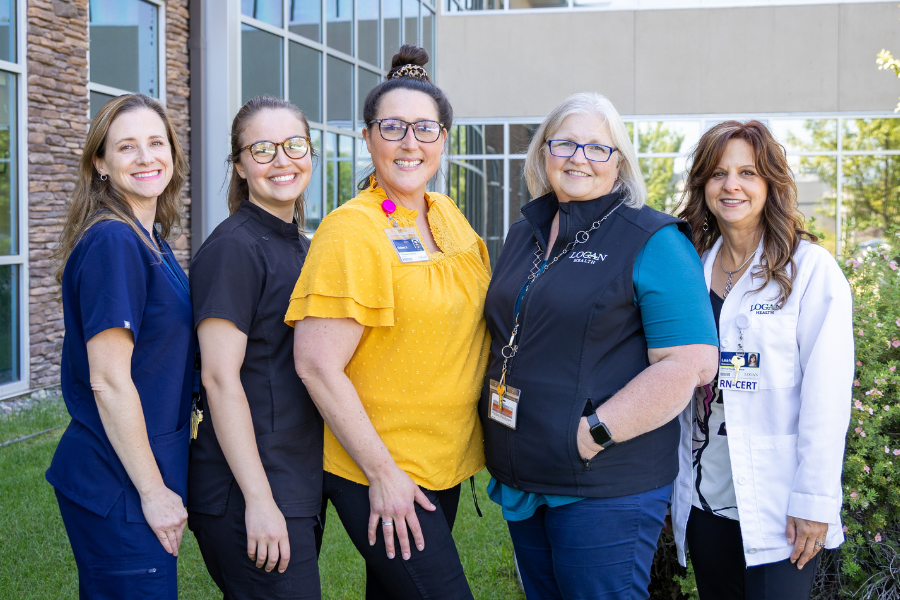
(Left to right: Jaime Wyatt, CCRC, CPT, RMA; Zoe Glasser Breeding, CCRC; Helen Fagrelius, CCRC; Joanne Smith, Program Coordinator; Leah Scaramuzzo, Clinical Nurse Director: Research & Oncology Development)
In the busy halls of 350 Heritage Way, known as “The Rock,” individuals of all ages and cancer diagnoses visit their specialists for appointments or head to the infusion suite for care from our compassionate nurses. As they receive these important treatments, they are often unaware of a small office downstairs where a group of dedicated team members work tirelessly on their behalf. These individuals make up the Logan Health Research Department, and from that modest office, they are leading the way in Montana’s breast cancer clinical trials.
Clinical trials are research studies that create the opportunity for medical experts and patients to partner together and examine new ways to prevent, treat, and control disease. With patient safety as priority, a team of specialists and research coordinators closely assess the patient’s needs and work together to find solutions through breakthrough treatments. These often transform patients’ lives through innovation and ultimately contribute to the widespread use and accessibility of the new treatment. While cancer often comes to mind, the Logan Health Research Department also coordinates clinical trials in the specialties of cardiology, rheumatology, pulmonology, and endocrinology.
Breast cancer has been among the most-studied conditions as of late, especially with the introduction of targeted therapies. These targeted therapies are chosen based on the biology of the cancer tumor and the factors that drive the tumor’s growth. Clinical Research Coordinator Helen Fagrelius is tasked with connecting patients to these powerful treatments and explaining how they function. “Instead of attacking all fast-growing cells like chemotherapy does, targeted therapies work like a sniper — they aim at the fuel that is making the tumor grow,” Helen said. In her role, she’s had a front-row seat to witness the benefits of these new treatments. “We’ve seen the entire treatment landscape change through targeted therapies,” she stated. “We are seeing significant extensions in survival, quality of life, and more personalized care.”
Four specific clinical trials are currently available at Logan Health, assessing the effectiveness of targeted therapies for patients with breast cancer.
1. NCT05812807 — OptimICE-PCR: Pembrolizumab vs. Observation in Early-Stage Triple-Negative Breast Cancer
This study is investigating if women with early-stage triple-negative breast cancer (TNBC) who have no visible cancer after pre-surgery treatment with pembrolizumab need more of the pembrolizumab after, or just careful monitoring through observation. If monitoring is just as effective, patients could avoid extra treatment, side effects, and costs.
2. NCT06058377 — Adding Durvalumab to Chemotherapy in High-Risk HR+/HER2– Breast Cancer
This study asks: For women with hormone receptor-positive (HR+), HER2-negative early stage breast cancer who are at a very high risk of recurrence, does adding the immunotherapy drug durvalumab to standard chemo before surgery increase the chance of curing the cancer? If this treatment combination works, it could boost cure rates in this specific high-risk group.
3. NCT05929768 — SCARLET: Shorter Anthracycline-Free Chemo-Immunotherapy in TNBC
This study focuses on if early-stage TNBC can be treated with a shorter, less intense chemo-immunotherapy plan (skipping more toxic anthracycline drugs) and pembrolizumab, rather than the longer regimen. If effective, this could reduce side effects and discomfort from treatment while maintaining outcomes.
4. NCT04457596 — CompassHER2 RD: T-DM1 + Tucatinib vs. T-DM1 Alone in High-Risk HER2+ Breast Cancer
This study asks: For HER2-positive breast cancer patients who still have cancer after initial chemo and HER2-targeted therapy, does combining T-DMI (a “smart chemo” attached to a HER2-blocking antibody) with tucatinib improve outcomes compared to T-DMI alone? This could help prevent relapses, including in the brain, by enhancing targeted treatment in patients with residual disease.
These clinical trials have the potential to enhance the experience for breast cancer patients in many ways. Patients gain early access to these promising treatments that aren’t available elsewhere. They also receive very personalized care with more frequent check-ins and extra lab tests or scans. In fact, patients in clinical trials often do just as well — or better — than those receiving standard treatment. Many also say they feel more supported and informed throughout the process.
For Helen, this person-centered care is what it is all about. “I always remind patients that nobody is a better advocate for your health than you. Being able to connect with patients one-on-one, getting to know them and seeing them advocate for themselves is the best part of my job.”
As Helen and her team members continue their efforts to support breast cancer patients in Montana, they look forward to the new innovations on the horizon and the continued empowerment of patients near and far.
If you are interested in exploring your options for cancer research and clinical trials, please visit logan.org/research or call our research team at (406) 751-4171. You can also email DEPTresearch@logan.org
